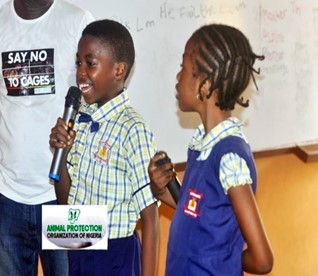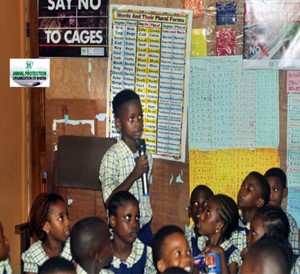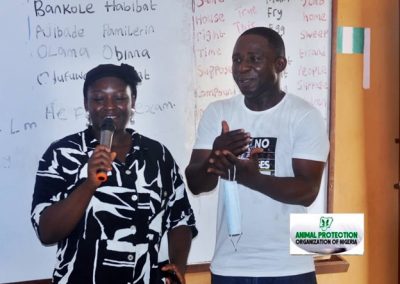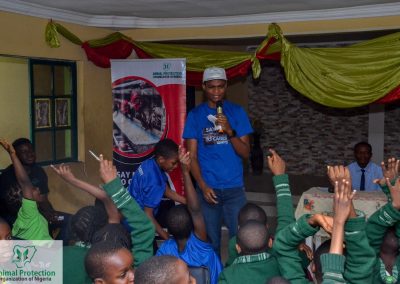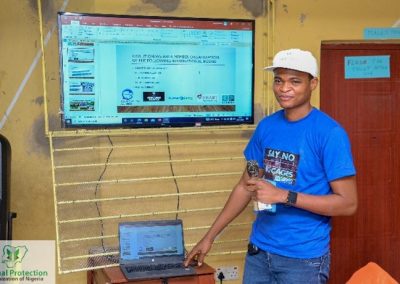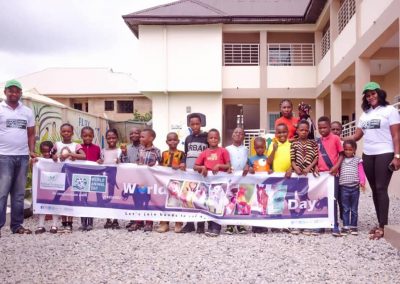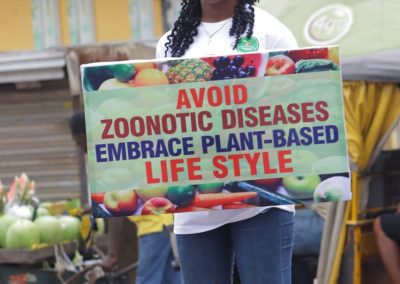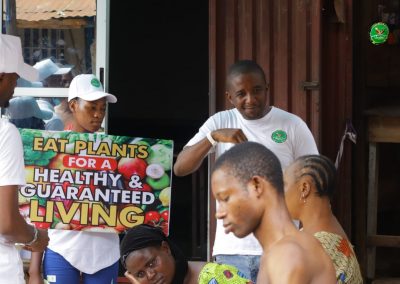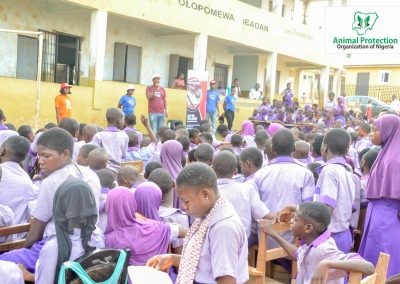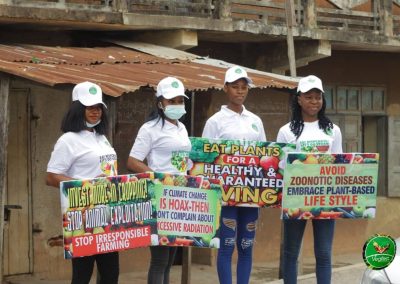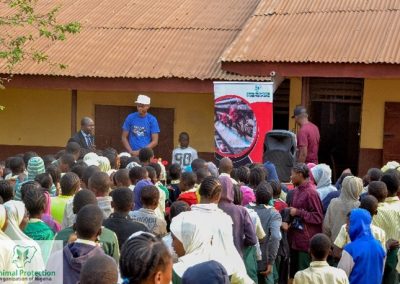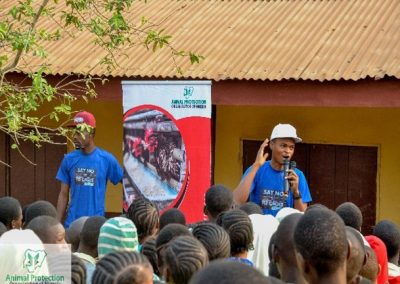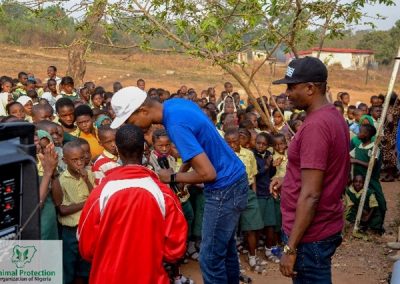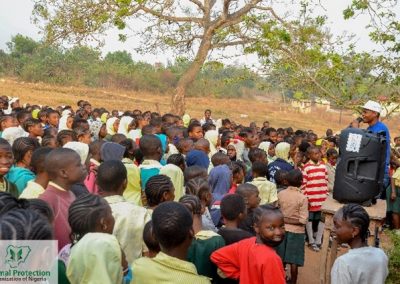Teaching Compassion and Empathy
APON’s mission is to protect the rights and welfare of every animal through campaigns and compassionate education. They also educate on the benefits of plant-based diets for health and the environment.
Joseph has kindly shared an example of his wonderful humane education programme for children in reception and primary schools.
Now the big question is this, are all these institutions of learning shaped to deliver the best moral values?
In modern-day moral value delivery, critics suggest that moral values without applying the concept of social justice are incomplete. Education opens humans to acquiring knowledge that is needed to make exploit and excel in life. Without combining this with empathy and compassion, the world will become chaotic. In Africa for instance, children are taught to respect people (family and school), but many Africans don’t value animals because there is no foundational teaching of animal sentience.
The purpose of this training program is to change the narratives in the younger generation by establishing a foundation (structure) in our school system with the basic knowledge of respecting all life forms, which include humans, animals, and the planet.
The aim is to restructure what moral values stand for. As we may know, the 5 core moral values are respect, responsibility, fairness, honesty, and compassion. It is on the premises of these value systems that social justice is imbibed.
The program is designed into 2 modules.
1. KINDNESS FOR ALL
Kindness for All is a seven-lesson curriculum, designed for three-to-five-year-olds, that aims to inspire children to act with kindness toward all living beings and the natural world.
KINDNESS FOR ALL: A Curriculum for Pre-K students
These lessons provide a framework for developing a positive and engaged classroom through simple but impactful practices.
Understanding Our Feelings
Students share how they are feeling. Then, they sing a song to help expand their vocabulary for identifying feelings. While discussing real-world scenarios, students think about how they would feel in those situations. Then, they learn some strategies for managing their feelings in healthy ways. Finally, students make “feeling” pictures to illustrate an example of when they have felt a certain emotion.
Respecting All People
Students learn about the similarities and differences between themselves and their classmates through an interactive game. Short narratives about people with diverse backgrounds and life experiences will be read aloud. Then, students are asked to draw a picture to share something that is special about themselves.
Animals Have Feelings Too
Students learn about the feelings that our animal companions have and how to understand dog and cat body language. Then, they practice how to safely approach an animal companion. They make sculptures of dogs and cats out of clay and show the animals expressing certain feelings. Students also discuss the circumstances under which an animal might express each of these different emotions. Students will also learn from this lesson why plant-based food should be considered alternative to animals.
Animal Needs
Students learn about some of the basic needs of dogs and cats. They compare and contrast the needs of animal companions to the needs of people and discuss how someone might feel if they did not have their needs met. Then, they apply what they learned by making a cat toy that meets an important animal need.
Respecting Animal Neighbors
Students discover why it is important to protect the natural world and to respect the animals with whom we share our environment. Students also talk about how litter can harm animals, and they practice cleaning up their neighborhood by picking up trash around their classroom and learning about which items can be recycled. Finally, students sing a song about caring for our planet.
What Kindness Looks Like
Students play a game to review what they have learned throughout the Kindness for All unit. Then, they are presented with various situations and they have to decide whether or not someone demonstrated kindness in the situation. Finally, students work together to create a kindness collage.
Kindness for All
Students investigate different kinds of behaviors by looking at pictures and organizing them into one of two categories: “Helpful Behaviors” or “Not Helpful Behaviors.” Then, they are presented with various scenarios so that they can think about how someone can show kindness in each situation. They role-play these scenarios and practice acting with kindness. Finally, students work together to create a kindness chain that will serve as a reminder of their commitment to act with kindness.
2. JUSTICE FOR ALL
Educating Youth for Social Responsibility. GRADES K – 5
Justice for All: Educating Youth for Social Responsibility is a comprehensive humane education resource guide. Comprehensive humane education addresses human rights, animal protection, environmental ethics, and the ways in which these areas are interconnected. Imagine A world where children learn to peacefully co-exist with one another; a world where children learn to respect and honor the environment; a world where children learn to protect the myriad species with whom we share this planet. Humane education encourages students to think about their responsibility to the earth and all of its inhabitants and provides youth with the tools to make more informed and compassionate choices. By allowing students to learn crucial information and develop solutions for many of the modern issues facing our world, humane education promises to usher in a global community that is prepared to make the planet a more peaceful and sustainable place. Animal Protection Organization of Nigeria and our foreign partners, created this resource guide to help educate youth for social responsibility. Our mission is to foster compassion and respect toward all living beings and the environment. As a full-service humane education provider in Nigeria, APON conducts student programs (in-school, after-school and in summer camps), offers professional development workshops for teachers both nationally and internationally, develops educational resources, and advocates for humane education.
As we are poised at making the world a peaceful place for all live forms, we shall engage in educative programs to inspire, and empower people to live peacefully.

